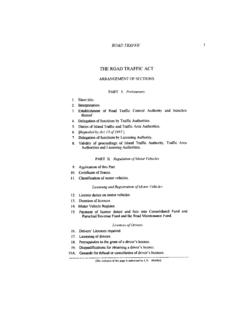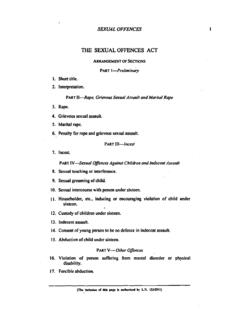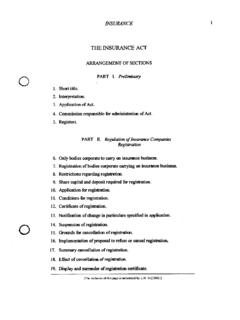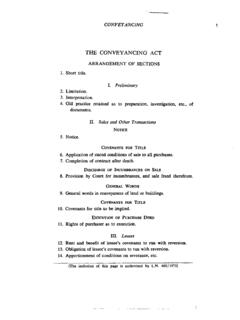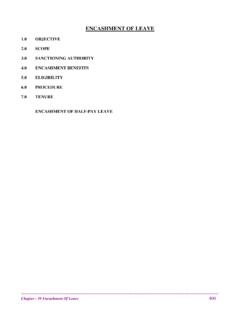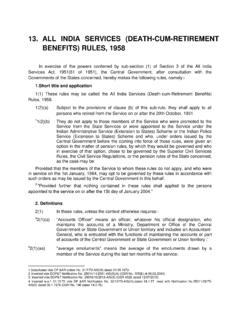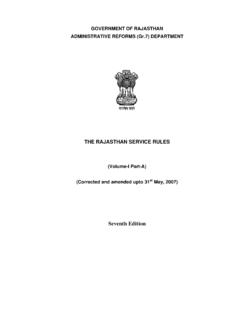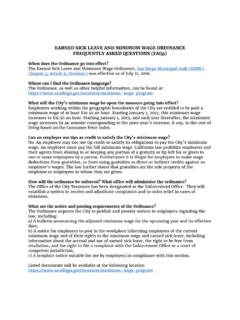Transcription of HOLIDAYS WITH PAY
1 HOLIDAYS WITH PAY. THE HOLIDAYS WITH PAY ACT. ORDER. (under section 3). (Made by rhe Minister on the 22nd day of May, 1973) L . N . 1x9173. st June, t.'Ed:m,x 54~191. 1. This Order may be cited as the HOLIDAYS with Pay Order. 1973. CiLdon. Interprc- (1) In this Order unless the context otherwise requires- cation. "normal wages" means in relation to any worker, the remuneration regularly paid to him by his employer as wages or commission. and includes any amounts regularly so paid by way of bonus as part of such remuneration but does not include- (a) any overtime wages; or (b) any premium or special allowance paid- (i) in consideration of the times at which, or the condi- tions subject to which, or the circumstances in which, he works in the course of the performance of his duties; or (ii) in consideration of any inconvenience suffered or likely to be suffered by him in the course of the performance of his duties;. "normal working w e e k means the number of days in a week on which the worker in relation to whom that expression is used is normally required to work for the employer by whom a holiday with pay or sick leave with pay is granted under this Order.
2 "public general holiday" has the meaning assigned to that expres- sion by the HOLIDAYS (Public General) Act;. "qualifying year" means, in relation to the employment of any worker to the person who for the time being is his employer. a period of twelve months commencing, in the case of the first qualifying year- [The inclusion of this page is authorized by ). THE HOLIDAYS WITH PAY ORDER, I973. (a) on the 1st day of January, 1973, if such employment was in existence on that date; or (b) on the first day of such employment if that day is later than the 1st day of January. 1973. and in the case of the second and subsequent qualifying years, on the date immediately following the preceding qualifying year;. "worker" means any person who has entered into or works under a contract with an employer, whether the contract be by way of manual labour, clerical work or otherwise, be express or implied, oral or in writing and whether it be a contract of service or of apprenticeship or a contract personally to execute any work or labour, but does not i n c l u d e (a) any person employed by the Government; or (b) any person employed in the service of the Kingston and St.]
3 Andrew Corporation Council or of any Parish Council;. or (c) a director of any company who is employed by that company. (2) For the purposes of this Order a worker shall be deemed- (a) to have worked, on any day of holiday with pay granted to him under this Order, for the employer by whom such holiday was granted;. (b) to have worked for his employer on any day of sick leave with pay granted under this Order if that employer would, but for the fact that he was granted sick leave, normally have required him so to work;. (c) to have worked for his employer on any day on which that employer would, but for the fact that such day was Good Friday or Christmas Day or a public general holiday, normally have required him so to work;. (6) to have worked for a full day whenever he is required to work for a part of any day. Holiday with pay. 3 . 4 1 ) Any worker, other than a casual worker, who works for any employer on not less than 110 days in any qualifying year shall be granted a holiday with pay by that employer in respect of that qualify- ing year.
4 Me inclusion of this page u authorized by 24119941. THE HOLlDAYS WITH PAY ORDER, 1973. (2) The duration of such holiday with pay shall be determined Schedule. in accordance with the Schedule. ) The holiday with pay which any worker has earned in any When and how holi- qualifying year under paragraph 3- day with pay is to be (a) shall be granted by his employer during the next succeeding granted. qualifying year; or (b) may, by agreement between him and his employer, be granted during that qualifying year; or (c) may be carried forward and added to any holiday with pay which he may earn in the first two succeeding qualifying years if there is provision for accumulation of holiday with pay for not more than three consecutive years in an agreement sub- sisting between him, or a trade union representing him, and his employer or an organization representing his employer. (2) Subject to the provisions of sub-paragraph (3) the days of a holiday with pay which is granted under this Order shall be consecutive working days, being days on which the worker to whom such holiday with pay is granted would normally be called upon to work for the employer by whom such holiday with pay is granted.
5 (3) The holiday with pay which any worker has earned in any qualifying year under this Order may be granted in two periods of consecutive working days. (4) Sunday, Good Friday, Christmas Day and a public general holiday shall not be reckoned in any holiday with pay granted under this Order and the days of such holiday shall be treated as consecutive notwithstanding that Sunday, Good Friday, Christmas Day oc a pubKc general holiday intervenes. (5) A holiday with pay shall not be granted to any worker during a period of notice given by his employer to terminate his employment. (1) The minimum holiday remuneration payable to a worker r;"diym employed at time rates shall- rernuner- ation. (a) in respect of each week of his holiday with pay, be the normal wages earned by him in respect of the last normal working week, prior to the commencement of such holiday. during which he worked for the employer by whom such holi- day is granted; or IThe inclusion of this page is authorized by 4119761.
6 THE HOLIDAYS WITH PAY ORDER, 1973. (b) in respect of each day of his holiday with pay, be the normal wages earned by him in respect of the last normal working week referred to in sub-paragraph (a) divided by the number of working days constituting such normal working week. (2) The minimum holiday remuneration payable to a worker employed at piece or task rates or on a commission basis shall, in respect of each day of his holiday with pay, be 1/65 of the total normal wages earned by him in respect of the last 13 weeks (which need not be consecutive but in each of which he worked for the employer by whom such holiday is granted) prior to the commencement of such holiday. (3) Any worker to whom a holiday with pay is granted under this Order shall be paid by his employer, before the commencement of such holiday, the holiday remuneration payable to such worker in respect of the whole period of the holiday so granted. gratuity (1) Any worker who is employed as a casual worker shall, at or to casual worker.
7 Before the end of each qualifying year, be paid a gratuity by any employer by whom he is so employed if during that qualifying year- (a) he has worked for not less than 110 days for his employer; or (b) where the number of days of work cannot be ascertained, he has earned , as normal wages from his employer, a sum equiva- lent to 110 times the established daily rate for the category of work performed by him in an area where there was such established daily rate; or (c) where the number of days of work cannot be ascertained and there is no such established daily rate, his name has appeared on the paybills of his employer for not less than twenty weeks. (2) The minimum gratuity payable to a casual worker under this paragraph shall be 3 per cent of the total wages earned by him during the year in respect of which, and in the service of the employer by whom, such gratuity is payable. Holiday ) Upon termination of the employment of any worker his remuner- a ~ o nand employer shall- gratuity on termin- ation of (a) where that worker earned any holiday with pay which was not I cmploy- mcnt.
8 Granted befare such termination, pay him a sum equal to the holiday remuneration which would have been payable to him if I. all such holiday were then being granted; or [The inclusion of this page is authorized by ). THE HOLIDAYS WITH PAY ORDER, I973. (b) pay him any gratuity which he earned and did not receive before such termination. (2) Where the employment of any worker is terminated not more than two weeks before the transfer of the undertaking in which he was employed at the time of such termination, any sum which is payable to \ him under sub-paragraph (1) shall, unless it is paid to him before such transfer, be paid by the person to whom the undertaking is transferred. &--(I) Any worker, other than a casual worker, who becomes ill sick leave w ~ t hpay. during the first twelve months of his employment shall, if he has worked for his employer on not less than 110 days be entitled to be granted, during those twelve months, sick leave with pay of a duration of 1 day for every 22 days on which he so worked.]
9 (2) Any wmker, other than a casual worker, who becomes ill after the first twelve months of his employment shall be entitled to be granted, in each period of twelve months after the first, sick leave with pay of a duration of 2 normal working weeks. (3) Notwithstanding the provisions of sub-paragraphs (1) and (2). a worker shall not be entitled to be granted sick leave with pay under this Order for any period of illness- (a) in respect of which he is entitled to be paid sick benefit or employment injury benefit under the National Insurance Act or compensation under the Workmen's Compensation Act; or (b) in respect of which- (i) he fails to satisfy any condition relating to the granting of sick leave with pay contained in an agreement of the kind described in sub-paragraph (6);. (ii) where there is no condition of the kind referred to in sub-paragraph (i), he fails to notify his employer of his illness during the first working day after its oc- currence and, if the period exceeds three days, to furnish his employer with a certificate from a registered medical practitioner stating that he is ill and specifying the period during which he will, by reason of such illness, be unable to perform his duties.
10 (4) The minimum remuneration payable during any period of sick leave with pay granted to a worker under this paragraph shall be m e inclusion of this page is authorized by 4/1976]. THE HOLIDAYS WITH PAY ORDER, 1973. the amount which would have been payable to him as holiday remunera- tion under paragraph 5 if such period of sick leave with pay had been a period of holiday with pay. (5) For the purposes of this paragraph any fraction of a day which is obtained by dividing a number of days of work by 22 shall be reckoned as 1 day. (6) The agreement referred to in sub-paragraph (3) is an agree- ment- (a) between the worker to whom that sub-paragraph refers, or a trade union representing him, and his employer or an organiza- tion representing his employer; and (b) containing provisions for sick leave with pay or sick benefit which are, in a general way, more favourable to the worker than those contained in this Order. Sick benefit to (1) Subject to the provisions of sub-paragraph (3) any workex casual workers.


